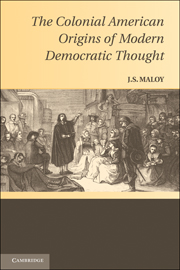Book contents
- Frontmatter
- Contents
- Preface
- 1 Introduction: Accountability and Democratic Theory
- 2 Radical Trust and Accountability in the Seventeenth Century
- 3 Fidelity and Accountability in Virginia and Bermuda
- 4 Politics and Ecclesiastics in Plymouth and Massachusetts
- 5 Constitutional Conflict and Political Argument at Boston
- 6 Democratic Constitutionalism in Connecticut and Rhode Island
- 7 Conclusion: Anglophone Radicalism and Popular Control
- Bibliography
- Index
7 - Conclusion: Anglophone Radicalism and Popular Control
Published online by Cambridge University Press: 03 December 2009
- Frontmatter
- Contents
- Preface
- 1 Introduction: Accountability and Democratic Theory
- 2 Radical Trust and Accountability in the Seventeenth Century
- 3 Fidelity and Accountability in Virginia and Bermuda
- 4 Politics and Ecclesiastics in Plymouth and Massachusetts
- 5 Constitutional Conflict and Political Argument at Boston
- 6 Democratic Constitutionalism in Connecticut and Rhode Island
- 7 Conclusion: Anglophone Radicalism and Popular Control
- Bibliography
- Index
Summary
Those whom I have been calling the first modern democrats in the pages above made three key theoretic moves in the middle seventeenth century: they advanced (a) the accountable over the discretionary conception of political trust, (b) popular over elite or representative bodies as agencies of accountability, and (c) regular procedures within a legal order over emergent moments of war and resistance as occasions of accountability. In terms of institutional design, they made non-electoral mechanisms of accountability a necessary supplement to the authorization of governors through regular elections. In short, they reconstructed the ancient conception of democratic accountability to fit distinctively modern conceptions of legitimacy, consent, and representation.
Those who first made these theoretic moves were colonists in New England in the 1630s who sought to bring colony officers under the control of the whole body of freemen, whether by reforming existing laws in Plymouth and Massachusetts or by creating new constitutions in Connecticut and Rhode Island. Though these colonial reformers' rationales and arguments are not well represented in the extant documentary record, there are indications from the Rhode Island assembly of 1647 and the town of Providence's instructions to its deputies that they considered their representatives strictly accountable to their local constituents; and, from the correspondence of Israel Stoughton, that they regarded Athenian-style practices of audit, impeachment, and rotation as necessary to control magistrates independently of regular elections. The Levellers' proposals for constitutional reconstruction in England in the later 1640s, rather more amply documented, show more clearly the assimilation of ideas of accountable trusteeship and other forms of revocable agency (attorneys, proxies, stewards, etc.) to the language of representation.
- Type
- Chapter
- Information
- The Colonial American Origins of Modern Democratic Thought , pp. 171 - 190Publisher: Cambridge University PressPrint publication year: 2008



